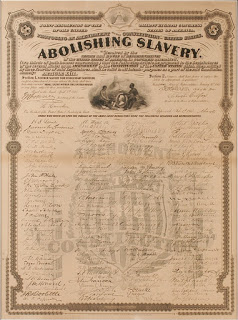The Thirteenth Amendment
At the time of the raid, America was divided. Brown was hopeful for a peaceful compromise, but his actions prohibited that as an option. As a result of the differing opinions over slavery between the North and the South, the country was at a breaking point. Historians say the Civil War did not start in 1861, but started in 1859, due to Brown’s violent uprising.
Although the 1859 raid on Harpers Ferry was deemed unsuccessful at the time, Brown’s concept was recognized six years later when President Abraham Lincoln influenced Congress to pass the Thirteenth Amendment which abolished slavery. It was passed on January 31, 1865, and was a breakthrough for African Americans as it would free thousands of slaves every day until approximately 3.9 million slaves were freed by the end of the 1860s.
John Brown had an immense impact on many people in the nineteenth century, specifically the people in the South due to their involvement with slavery. Even now in the twenty-first century, Brown’s acts are still recognized today, as his actions inspired people of all ethnicities to stand up for their beliefs and rights.

The Thirteenth Amendment, 1865, Blogspot
"I think Slavery is wrong, morally, and politically. I desire that it should be no further spread in these United States, and I should not object if it should gradually terminate in the whole Union."
- Abraham Lincoln, September 17, 1859, National Park Service
Previous PageHome